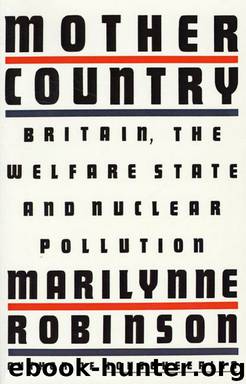Mother Country by Robinson Marilynne

Author:Robinson, Marilynne
Language: eng
Format: epub
Publisher: Farrar, Straus and Giroux
Published: 2011-03-31T16:00:00+00:00
Britain has only a shadow government. Its opposition is the shadow of a shadow, and fading. It is a government made not to shape reality but to conceal it. Yet the uncountenanced reality replicates itself like a compulsive gesture or an obsessive fantasy.
British records and social institutions are shielded by the laws that protect military secrets. There was a government attempt to suppress the 1987 report on inequalities in health that led to its being distributed from behind a guitar store, according to the press. Yet there is a profound respect for the conventions of secretiveness reflected in the willingness of distinguished men to compile and interpret information which conceals the conditions their work purports to describe.
Secrets are not merely kept, I think, but treasured. They give latitude to the old vice of punitive and abusive behavior, which lends piquancy to the great apparent seemliness of the people who preside over these same abuses. I have, over the years, gathered stories about the extraordinary exploitation of a boys’ orphanage in Northern Ireland, and about an elderly woman horribly murdered, apparently by the police, because of her involvement in nuclear issues. Accounts of abusiveness and, especially, filth, in hospitals, prisons, insane asylums, and military training camps are very common, and simply too disgraceful to repeat. Anyone who is curious can go to the library.
In the nineteenth century the uncountenanced poor were called the “residuum.” The same word was used to mean sewage. Scholars will note the powerful association of the socially rejected with filth. For example, British prisons have no toilets. Prisoners share densely crowded cells with a plastic bucket, which is emptied by them once each day. Some of these prisoners are debtors, of course, who have lived with such insult and nastiness since Britain first began its half millennium of misericordia.
That there should be a great secret, and a great denial; that the secret should involve filth and violence, in forms that are rarefied but at the same time quintessential; that there should be manufacture and world commerce and enormous profits involved, and a work force disciplined by poverty; all these things make Sellafield seem of a piece with its cultural setting. Finally, however, I am at a loss to describe the place it occupies in reality, wreathed as it is with distorted perceptions, with information pulled out of shape by the strategies of denial. I do not know the meaning of the violence the British government has done to its country and the world. I am sure no one could explain it to me. I think I am describing pathology.
In 1909 the quondam Fabian H. G. Wells published a novel titled Tono-Bungay, which anticipates the British nuclear enterprise in its most extraordinary aspect, the commercial importation of radioactive waste. Wells introduces the subject almost as an aside, yet with an eerie precision of detail. The stuff is called quap, “ … the most radioactive stuff in the world. That’s quap! It’s a festering mass of earths and heavy
Download
This site does not store any files on its server. We only index and link to content provided by other sites. Please contact the content providers to delete copyright contents if any and email us, we'll remove relevant links or contents immediately.
Man-made Catastrophes and Risk Information Concealment by Dmitry Chernov & Didier Sornette(6001)
The Revenge of Geography: What the Map Tells Us About Coming Conflicts and the Battle Against Fate by Kaplan Robert D(4066)
Zero Waste Home by Bea Johnson(3829)
COSMOS by Carl Sagan(3617)
Good by S. Walden(3543)
In a Sunburned Country by Bill Bryson(3528)
The Fate of Rome: Climate, Disease, and the End of an Empire (The Princeton History of the Ancient World) by Kyle Harper(3055)
A Wilder Time by William E. Glassley(2854)
Camino Island by John Grisham(2792)
Organic Mushroom Farming and Mycoremediation by Tradd Cotter(2684)
The Ogre by Doug Scott(2678)
Human Dynamics Research in Smart and Connected Communities by Shih-Lung Shaw & Daniel Sui(2495)
Energy Myths and Realities by Vaclav Smil(2481)
The Traveler's Gift by Andy Andrews(2447)
9781803241661-PYTHON FOR ARCGIS PRO by Unknown(2361)
Inside the Middle East by Avi Melamed(2347)
Birds of New Guinea by Pratt Thane K.; Beehler Bruce M.; Anderton John C(2248)
A History of Warfare by John Keegan(2231)
And the Band Played On by Randy Shilts(2185)
